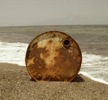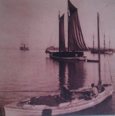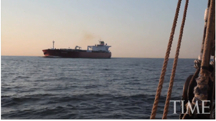Home
|
by Aaron G. Lehmer-Chang
|
 corporate capture
If we environmentalists were honest with ourselves, we would have to admit that several decades of heroic efforts to curb carbon emissions have yielded very little progress. Despite repeated warnings from scientists and the inspiring rise of climate activism, global emissions continue to grow, having recently passed the dangerous threshold of 400 parts per million (ppm). |
|
|
by Peter Crabb
|
 A consensus appears to have been reached that the world's production of conventional oil peaked in recent years. And to many observers, it means that from this time forward the supply of oil and natural gas, along with peaking coal and uranium, will decrease toward zero, leaving global Industrial Culture without the precious energy that made that culture possible. With such a precipitous future awaiting the Industrial Tribe, it is curious that one does not hear much about declining energy supplies in the mainstream media. Instead, we are bombarded daily with the “Industrial Progressive Narrative” (Princen et al, 2013), a comforting meme that portrays society as having ever-more energy resources that will drive never-ending growth into the future: A consensus appears to have been reached that the world's production of conventional oil peaked in recent years. And to many observers, it means that from this time forward the supply of oil and natural gas, along with peaking coal and uranium, will decrease toward zero, leaving global Industrial Culture without the precious energy that made that culture possible. With such a precipitous future awaiting the Industrial Tribe, it is curious that one does not hear much about declining energy supplies in the mainstream media. Instead, we are bombarded daily with the “Industrial Progressive Narrative” (Princen et al, 2013), a comforting meme that portrays society as having ever-more energy resources that will drive never-ending growth into the future: |
|
|
by Jan Lundberg
|
 New peer-reviewed research has found that just 90 entities are responsible for extracting most of the fossil fuels that have been burned over the past 150 years. These “carbon majors” include 50 investor-owned companies, such as ChevronTexaco and Exxon-Mobil, 31 state-owned companies, such as Saudi Aramco and Pemex, and nine government-run industries in the former Soviet Union, China and other countries. New peer-reviewed research has found that just 90 entities are responsible for extracting most of the fossil fuels that have been burned over the past 150 years. These “carbon majors” include 50 investor-owned companies, such as ChevronTexaco and Exxon-Mobil, 31 state-owned companies, such as Saudi Aramco and Pemex, and nine government-run industries in the former Soviet Union, China and other countries.
Emissions from burning these fuels total nearly two-thirds of all the carbon that has been emitted into the atmosphere during the industrial era. |
|
|
by Jan Lundberg
|
 The Tres Hombres, the celebrated engineless 32-meter schooner brig owned by Fair Transport, is on her longest voyage yet. She set out from home port Den Helder in Holland on October 18, 2013. By way of Norway and Portugal, she has just arrived in Las Palmas, Canary Islands in the eastern Atlantic. The Tres Hombres, the celebrated engineless 32-meter schooner brig owned by Fair Transport, is on her longest voyage yet. She set out from home port Den Helder in Holland on October 18, 2013. By way of Norway and Portugal, she has just arrived in Las Palmas, Canary Islands in the eastern Atlantic.
For the fourth straight year, Tres Hombres begins its trade-wind romp across the Atlantic. In a few weeks she will make landfall in the New World and begin once again the loading of high quality goods to sail -- with no petroleum power -- to northern Europe. [See map at bottom.]
|
|
|
by Jan Lundberg
|
 [This report covers, not surprisingly for followers of this publication, the SAIL consortium conference in Rotterdam Nov. 6-8, 2013.] [This report covers, not surprisingly for followers of this publication, the SAIL consortium conference in Rotterdam Nov. 6-8, 2013.]
There comes a time when everything else must stop, when a crisis is staring you in the face. Perhaps like a speeding train coming at you. This is one of those times, far and away the biggest event in human history.
Coverage and commentary: Methane Levels going through the Roof - from Arctic-News.blogspot.nl, Nov. 11, 2013:
|
|
|
by Jan Lundberg
|
 The young man sat on the pebbly beach, looked out over shades of turquoise framed by pine-studded points of sunlit land, and said to himself, "This is the place to be."
The young man sat on the pebbly beach, looked out over shades of turquoise framed by pine-studded points of sunlit land, and said to himself, "This is the place to be."
The next minute he noticed around him a couple of cigaret butts and bits of degraded plastic, and wondered aloud, "How can anyone harm nature?" Then in a matter of seconds he questioned who the hell he was to point a finger at any polluters, when he had taken a jet plane and used a car to get to this almost unspoiled spot. It was great to be in the Aegean instead of back in the States, but what was the worth of running around the globe trying to spice things up for a more meaningful life?
|
|
|
by V.I. Postnikov
|
 Loitering the central streets of my native town, Kiev, where I had lived for 63 years, I involuntarily examine the passers-by. Gosh, how changed the appearance of citizens! I notice some subspecies that I never met before--such as a subspecies of managers--short-haired young people in white shirts, a subspecies of guards--stern-looking lads with bull’s napes, a subspecies of builders--lads from other towns. The old age people are rarely seen on the streets. I peer at the faces, hoping to recognize familiar ones. But no, no way, they are all long gone. The species, the environment have changed irrevocably. Sad, but true.
Loitering the central streets of my native town, Kiev, where I had lived for 63 years, I involuntarily examine the passers-by. Gosh, how changed the appearance of citizens! I notice some subspecies that I never met before--such as a subspecies of managers--short-haired young people in white shirts, a subspecies of guards--stern-looking lads with bull’s napes, a subspecies of builders--lads from other towns. The old age people are rarely seen on the streets. I peer at the faces, hoping to recognize familiar ones. But no, no way, they are all long gone. The species, the environment have changed irrevocably. Sad, but true.
|
|
|
by Fernando Agudelo
|
 The size is 39 inches x 39 inches, oil on strectched canvas ready to frame. The selling price is to be $900-US.
The size is 39 inches x 39 inches, oil on strectched canvas ready to frame. The selling price is to be $900-US.
The fossil fuels corporations are on the hot seat right now. Fossil fuels are the modern slavery, and have murdered millions of white, black, hispanics and asians, a mass Holocaust Worldwide. In my study, the number of deaths that the fossil fuel industry have caused surpass the number of the total deaths from the First and Second World Wars combined.
|
|
|
by Aaron G. Lehmer-Chang
|
 Publisher's note: This article from World Shift Vision is what the New York Times should run, instead of the nonsense it ran that is addressed so well here. Publisher's note: This article from World Shift Vision is what the New York Times should run, instead of the nonsense it ran that is addressed so well here.
This month, The New York Times published a fantastical piece on human exceptionalism entitled “Overpopulation Is Not The Problem,” in which author Erle C. Ellis claimed that human societies have no limits to their growth. That’s right — limits are merely an illusion. Expansion über alles! That’s our species’ birthright, and rightful destiny.
|
|
|
by Jan Lundberg
|
 Note: this op-ed was featured on Truthout.org on Aug. 24, 2013. Note: this op-ed was featured on Truthout.org on Aug. 24, 2013.
A consensus seems to be building toward anticipating collapse. So what's your flavor? Financial meltdown with chaos? Petrocollapse? Climate extinction? The contributing crises are seemingly diverse, including Fukushima's mounting radioactive releases into the Pacific, the growing plastic plague and creeping GMO contamination. If none of those are your thing, you can acknowledge accelerating bee colony collapse. |
|
|
by Jan Lundberg
|
 The nations and waters of the North Sea comprise the modern world's most intensive sail transport environment. For those readers and sailors who have cheered on the Tres Hombres schooner-brig, and noted the creation of numerous sail transport projects here and there, the big eye-opener in terms of united international resolve can now be revealed: The European Union's SAIL project, part of the North Sea Region Program whose theme is "Investing in the future." SAIL's mission is to bring about the construction and operation of the first Wind Assisted Ship Propulsion (WASP) large cargo ship.
The nations and waters of the North Sea comprise the modern world's most intensive sail transport environment. For those readers and sailors who have cheered on the Tres Hombres schooner-brig, and noted the creation of numerous sail transport projects here and there, the big eye-opener in terms of united international resolve can now be revealed: The European Union's SAIL project, part of the North Sea Region Program whose theme is "Investing in the future." SAIL's mission is to bring about the construction and operation of the first Wind Assisted Ship Propulsion (WASP) large cargo ship. |
|
|
by Jan Lundberg
|
 The Aug. 7 video by Time Magazine's Bryan Walsh is the best one I've seen on global sail transport trends. As it is only a bit over 5 minutes, you can get brought up to speed and sense the excitement that is spreading. Time's coverage centers on Fair Transport's Tres Hombres schooner-brig and the group's plans for a four masted ecoliner to be four times as long as the 32-meter Tres Hombres. The Aug. 7 video by Time Magazine's Bryan Walsh is the best one I've seen on global sail transport trends. As it is only a bit over 5 minutes, you can get brought up to speed and sense the excitement that is spreading. Time's coverage centers on Fair Transport's Tres Hombres schooner-brig and the group's plans for a four masted ecoliner to be four times as long as the 32-meter Tres Hombres.
|
|
| << Start < Prev 1 . 2 . 3 . 4 . 5 . 6 . 7 . 8 . 9 . 10 . Next > End >>
|
|
|
|

